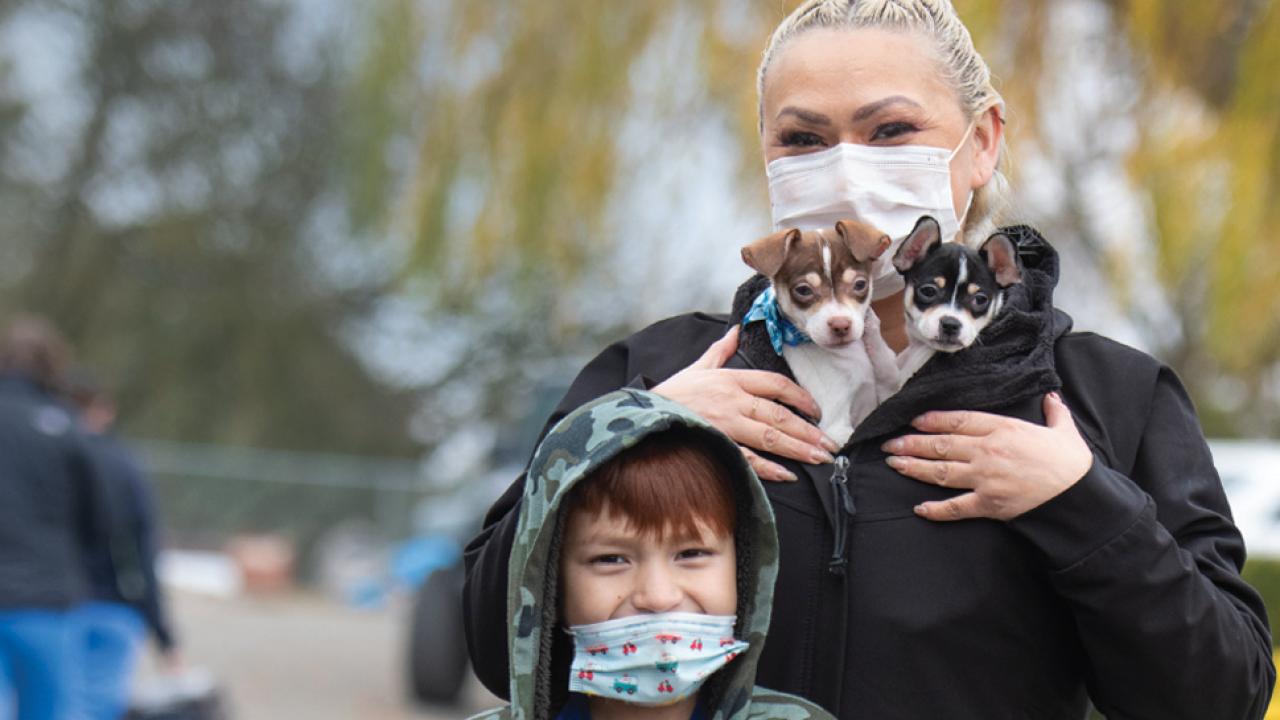
Access to Care
Serving Communities Close to Home
For the past 30 years, UC Davis veterinary students, faculty and staff have provided care for underserved pets. The community outreach started with Mercer Clinic for Pets of the Homeless in Sacramento in 1992, and grew to include a clinic in Knights Landing, a Mercer satellite clinic in Davis, and a clinic farther north in Mendocino County. Each of these programs may have a different history of origin, but they all share a dedication to caring for animals and providing access to care for the people who love them.
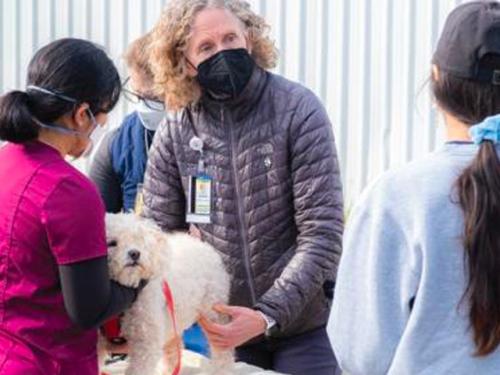
Knights Landing Clinic
Three tiny Chihuahua puppies pushed their noses out from the warmth of a black coat, jostling and licking each other in the cold December morning. Their owner, Sandra, handed one of them off to her son, Geo, to help wrangle. The eight-week-old pups were at the Knights Landing One Health Center (KLOHC) veterinary clinic for their first health checks and vaccinations, provided at no charge to residents of the small agricultural community 30 minutes north of Davis.
“This clinic is a great help financially and emotionally,” Sandra said. “Because we’re in a more rural area, we don’t have access to many services. The clinic helps us keep our pets healthy.”
The Knights Landing clinic is one of four student-run veterinary clinics through the UC Davis School of Veterinary Medicine that provide health care to dogs and cats in underserved communities. This one is unique in that it partners with the UC Davis School of Medicine, Betty Irene Moore School of Nursing, and the UC Davis Department of Chicano/a Studies to focus on a One Health approach. The veterinary component of the clinic was formed in 2013 after the human medical clinic had been operating for a year. Even though the clinics are held in different locations within the town, the two complement each other.
“We often see clients who wouldn’t miss vaccinations for their pets, but put their own health on hold,” said Dr. Jonathan Dear, who served as the clinic’s medical director from its inception until the fall of 2021. “The veterinary clinic serves as an open door to discuss health care for the rest of the family as well.”
Access to Care Program
Through the Access to Care Program, the school aims to provide world-class veterinary care to dogs and cats of clients with limited resources or other barriers to care. While UC Davis has operated some of the following organizations for years to decades, this program is designed to bring these organizations together and broaden the base of access to veterinary care.
The Community Surgery Service provides life-enhancing or life-saving surgical care to animals in the community. In the service, students perform surgical procedures such as spays/neuters, mass removals, limb amputations, urinary bladder stone removals, eye removals, and other basic procedures.
The UC Davis Fracture Program for Rescue Animals repairs long bone fractures in homeless dogs and cats from animal shelters and rescue groups, providing additional learning opportunities for veterinary students and residents of the Orthopedic Surgery Service and the Community Surgery Service. Following surgery and recovery (while being fostered by students), the rescued cats and dogs begin their journey toward a healthy and long life. Read more about student experiences in this program.
The Knights Landing One Health Center veterinary clinic is a free monthly clinic that serves the community of Knights Landing, California, a rural town located 20 miles north of campus. Dogs and cats receive physical examinations, vaccination, parasite prevention, and minor diagnostics and treatments. The clinic also offers translation services for Spanish speakers to provide the best communication between the volunteers and the clients.
The Orphan Kitten Project (OKP) is a student-run organization that cares for orphaned and abandoned neonatal kittens. On intake, kittens receive a complete physical exam from trained veterinary student coordinators. The kittens are placed with fosters within the public and veterinary community who volunteer their time to bottle-raise them in their own homes. Before the kittens are adopted, they are weaned, dewormed, vaccinated, FeLV tested, spayed/neutered, microchipped, and treated for any medical conditions. OKP also takes on other cases such as pregnant cats, orthopedic injuries (partnered with the Fracture Program), eye and skin issues, and other medical cases. Read more about this program.
Treatment of Animals Burned in Wildfires Every year, the UC Davis veterinary hospital treats dozens of animals burned in California wildfires. While the hospital treats many different species, the majority of those treated by the Access to Care team are cats. Since 2015, the team has treated more than 200 domestic and feral cats rescued from fire zones. Their injuries range from smoke inhalation and minor scrapes to third-degree burns to their paws and bodies.
Faculty:
Kristin Jankowski, VMD, CCRP – Chief of Access to Care
Jonathan Dear, DVM, MAS, DACVIM (SAIM)
Elizabeth Montgomery, DVM, MPH – Chief of Community Surgery
Karen Vernau, DVM, MAS, DACVIM (Neurology)
None of this would have come about without the Grupo de Mujeres, a Knights Landing women’s group that came together to discuss and advocate for the needs of their community. They had seen a steady loss of resources vital to their community’s well-being — the closure of a migrant health clinic, then the public park and teen center. The group reached out to the UC Davis Chicano/a Studies department and the School of Medicine, with the veterinary school coming on board shortly after with the help of Drs. Patricia Conrad and Paulina Zielinska Crook.
“This clinic brings people together and opens their eyes to different ways of providing medical care,” said Dr. Kristin Jankowski, the clinic’s new medical director and Access to Care service chief at the UC Davis veterinary hospital. “It allows students to understand ways to treat patients within what clients can afford and what facilities are available. It’s easy for some to think if you don’t have the resources to have a pet, you shouldn’t have one. But these are members of the family.”
Jankowski pointed to several factors that impact a person’s ability to meet the health care needs of their pets — or themselves. These include: cost, location (rural areas may not have a veterinary or human medical clinic for many miles), language barriers or cultural differences, lack of pet owner education, and poor veterinarian-client relationships.
Communicating in Spanish with the clients helps break down barriers. Several bilingual UC Davis undergraduates serve as interpreters at the clinic. Students and other volunteers had the opportunity to take a 10-week Spanish for Veterinary Professionals class last fall to assist them in conducting basic health assessments. It was taught by graduate students in the UC Davis Chicano/a Studies department and financially supported by the Veterinarians as One Inclusive Community for Empowerment (VOICE), a student-led organization promoting diversity.
“This was a great opportunity to gain conversational Spanish skills that apply specifically to veterinary health,” said Ruth Goins, a third-year DVM student and national VOICE president for the 2021-22 academic year. “Access to veterinary care is an important cornerstone of our education. As students, we recognize that being able to communicate with clients in their native language is an essential tool for our future careers, and will ultimately help us serve our communities better.”
A side benefit to building community trust through these clinics is exposing families to health care careers. To date, veterinary medicine has been a predominantly white profession. One way to change that and better reflect California’s multicultural population is to expose children at earlier ages to medical career choices such as becoming veterinarians, doctors, nurses, and veterinary technicians.
“It takes a village to run a successful clinic like this and we want it to serve as an example for others in the country to adopt,” Dear said.
In fact, it already has. Back in 2017, while Jankowski was serving as a board member of the Delaware Humane Association, she looked for national examples to help create the Delaware Humane Association One Health Clinic. She came across the Knights Landing clinic and contacted Zielinska Crook for an initial consult.
Several years later, Jankowski jumped at the chance to join UC Davis as a clinical assistant professor of Community Practice — in large part, she said, because she could combine her dream of teaching fourth year students clinical medicine while getting involved with the Knights Landing One Health Center.
Jankowski said the goal is to make access-to-care principles a core of the curriculum throughout all four years of DVM training. She’s also collaborating with the California Veterinary Medical Association as an advisor to the organization’s Access to Veterinary Care Task Force.
“Students need training to provide better access to care,” she explained. “We don’t want them to be shamed for offering spectrum of care choices. While the “gold standard” is one approach, it can be quite expensive and other options may be a better fit for that client-patient pair with a similar positive outcome.”
The reality is that the majority of people in this country can’t afford the most expensive work-up option for their pets, Jankowski said. Veterinary students need to be prepared to work in the real world.
“We can teach them to listen to client concerns and come up with a treatment plan that fits their budget and still provides good health care for their pet,” she said. “Sometimes, solutions to improve an ailing pet’s quality of life are simple, such as: providing affordable pain meds; using non-slip surfaces; elevating water and food bowls; or using a towel or blanket for support when navigating stairs.”
Teaching students how to offer access to care also reduces stress on new DVM graduates and in turn, improves their mental health. They are better prepared to explain the range of diagnostics/treatment options for particular health concerns and let the client feel empowered to choose the best path forward based on their situation.
“Compassionate care doesn’t come with a particular price tag,” Jankowski said. “It can come with any income level.”
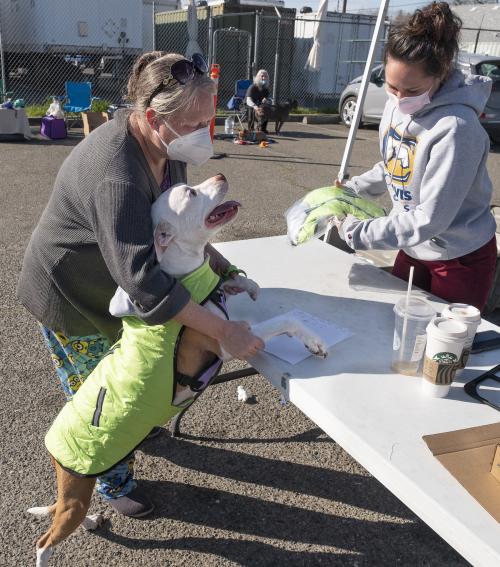
Mercer Clinic
Nicole waited with her 10-year-old dog Lily, while Tanner, her Chihuahua, was getting his nails trimmed and having bloodwork done — standard tests due to the arthritis medications he takes. Lily wiggled over on her leash to greet familiar faces gathering in the parking lot near Loaves and Fishes.
Mercer Clinic for Pets of the Homeless has been a source of veterinary care for three decades for pets of Sacramento residents without consistent housing. Nicole has brought her dogs to the clinic since 2008. While she has a job, she doesn’t make enough to cover all veterinary costs for her furry family members.
The focus of the clinic is on preventive care such as vaccinations, and flea and heartworm medications. Clients are also referred to spay/neuter clinics and for more serious medical care. Nicole’s other dog, Bentley, was diagnosed with mast cell tumors and referred to the Gourley clinic at UC Davis for surgery.
“I don’t know what I would have done without the Mercer Clinic over the years,” she said. “I’m so appreciative of the care we’re able to get here.”
Dr. Laurel Gershwin has been involved as a faculty mentor at Mercer since its early years. She has seen it grow from a makeshift clinic held under tarps in the parking lot, to an 80-by 20-foot prefabricated building, complete with electricity and plumbing. Dedicated as the Tom Kendall Teaching Clinic in 2014 in honor of one of clinic’s late co-founders, the permanent structure allows coordinators to store supplies such as prescription veterinary diets, pharmaceutical and lab equipment. In addition, there is a surgery room with anesthesia access (for simple procedures such as dental cleanings), and four treatment rooms especially useful for feline exams.
“I love working with the students,” Gershwin said. “The cases we see here allow me to show them immunology in action and serve as an extension of the classroom.”
She also appreciates working with the clients.
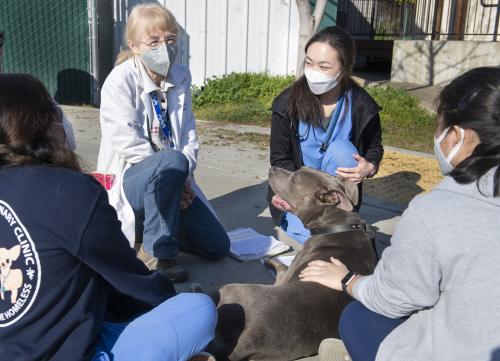
“Their animals are everything to them and they follow medication and care advice to the letter,” Gershwin said. “They have a deep appreciation for everything we’re able to provide for their pets who serve as their best friends and sources of emotional support.”
In November of 2020, the Mercer Clinic expanded its reach by establishing a satellite clinic in Davis, known as Davis Pet Advocacy and Wellness (PAW): A Clinic for the Pets of the Homeless. Despite an uneven start due to the pandemic, faculty advisor Dr. Janet Foley said they’ve established a monthly schedule, providing a valuable service to the community’s homeless population.
Davis PAW is a joint effort between members of the veterinary school, the City of Davis, and CommuniCare Health Centers. CommuniCare provides health services for the homeless population at the Davis Community Clinic near Sutter Davis Hospital as well as day services for the homeless in a city-owned Respite Center — the same location where Davis PAW holds monthly veterinary clinics. While Davis PAW is just beginning, Foley hopes that it can provide the same level of care and experience that Mercer Clinic has for years to come.
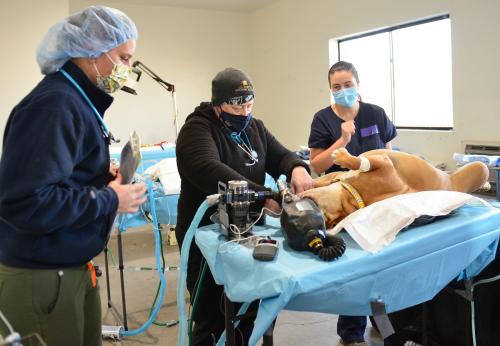
Covelo Clinic
Despite the freezing temperatures in Mendocino County last November, people began arriving at midnight to ensure their pet a surgery spot at the Covelo Clinic that would open at 7 a.m. for check-in.
With transportation and financial constraints in the rural area, most of the animals in Covelo have limited to no access to veterinary care. So, when the clinic is held two or three times a year, there’s a backlog of animals needing medical assistance, ranging from preventive wellness checks and medications to amputation.
Due to the distance from UC Davis, (nearly 200 miles), the Covelo Clinic is held over the course of a weekend, sandwiched between heavy coursework for students and intense patient caseloads for faculty and staff. The team of approximately 50 students, veterinarians, and technicians conducted 107 surgeries (mostly spays/neuters) in their last visit and saw 88 patients for wellness appointments.
“For some of these clients, we’re the only veterinary professionals they see,” said Makda Asrat, a combined DVM/Ph.D. student and one of three head coordinators for this clinic. “We’re able to form relationships with them over time and provide a unique teaching experience for the students.”
The Covelo Clinic was initially run through Rural Area Veterinary Services and Dr. Eric Davis, a 1977 Davis DVM graduate. While the clinic has had periods of dormancy and undergone changes in leadership, it was recently restructured as an official new student club, sanctioned by the university.
“Providing care to underserved communities fits in with the university mission and priorities for teaching students,” said Dr. Steven Epstein, one of the faculty advisors and an integral part of the team, thanks to his expertise in anesthesiology. “And it’s an incredibly rewarding experience when you see the appreciation from the community.”
The clinic collaborates with Better Options for NEglected Strays (BONES), a local charitable rescue program. When there is an animal that needs surgical services beyond a neuter or spay, BONES President Barb Thrasher communicates with the clinic team before they leave Davis so they can be prepared for what Epstein dubs “Barb specials.”
She also helps organize a group of women to cook for the team during the weekend. Many of them are in their 70s and beyond. Unfortunately, several have been lost to COVID.
“The community and BONES provide a strong infrastructure,” Epstein said. “We have a great relationship and couldn’t run the clinic where we do without them.”
Each of these clinics is dependent on the support of generous donors. If you are interested in partnering with us on providing veterinary care for underserved pets, please contact our Advancement team at 530-752-7024.
